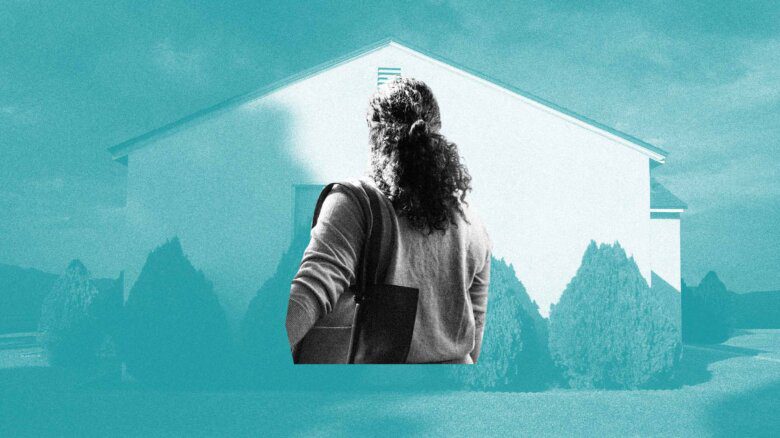For many Brooklynites, weekends are best spent strolling through one of the borough’s many parks with a cold-brew in hand, taking in the sounds of the neighbourhood. Between the pigeon coos, ice cream truck music and teens practising TikTok dances, you may hear someone yelling “Free queer books!”
Following the call will bring you to the Nonbinarian Book Bike, a Brooklyn-based mutual aid project that isn’t your average bicycle. Its wheels are attached to a bright pink box displaying dozens of books, educational flyers and colourful stickers where volunteers distribute LGBTQ2S+ literature to the community free of charge. The project was founded by K. Kerimian and has grown to about 30 on-the-ground volunteers, along with 80 members in their discord server providing digital help. The bike’s offerings include everything from queer history to self-published zines to beach reads, as well as books geared toward kids and non-English speakers.
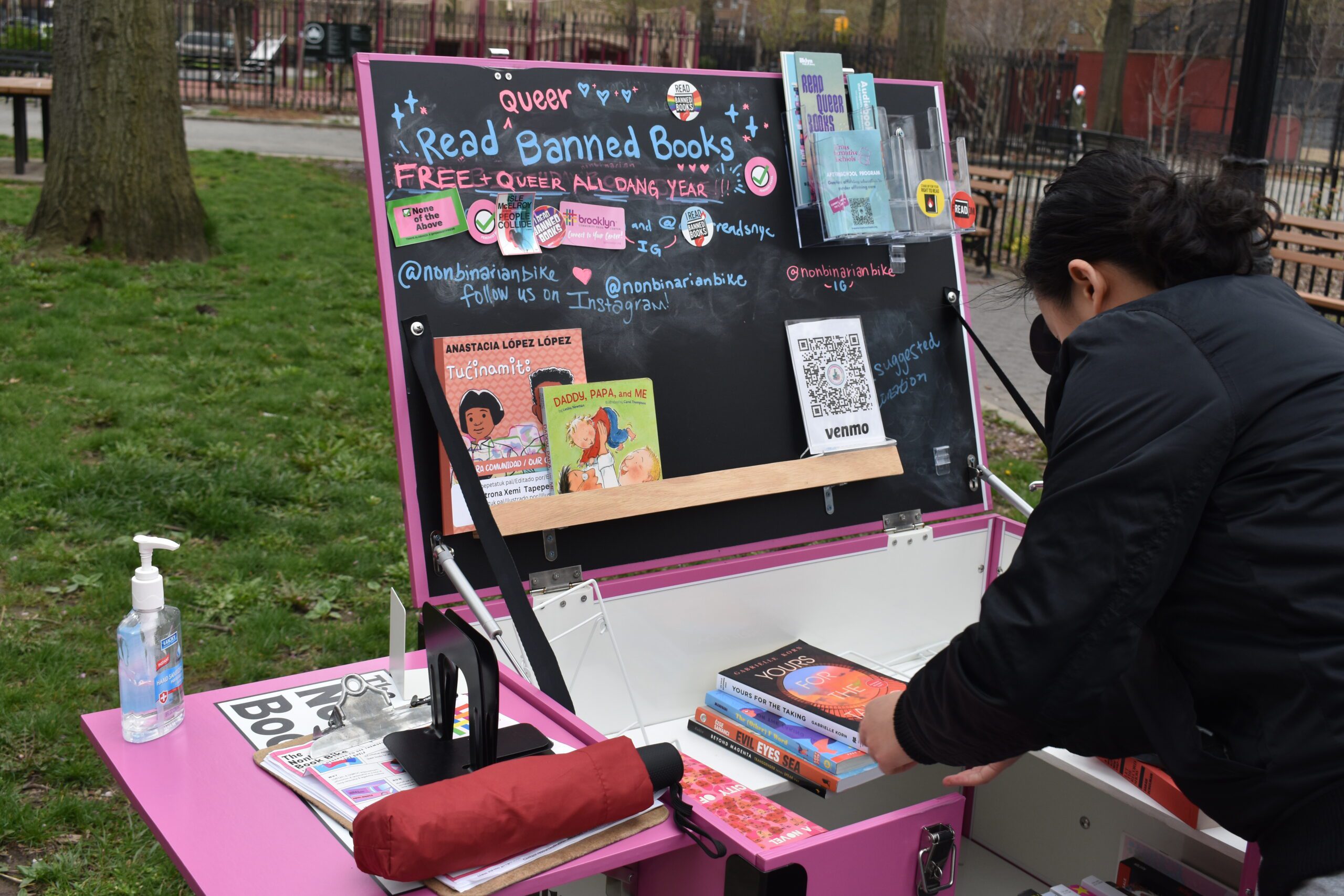
Credit: Jill Webb
The book bike usually sets up camp at a park or outside a library, drawing in a mixed crowd that includes families with young kids, queer and straight couples and dog owners out on their walks. Still, every now and then, volunteers get surprised by who takes interest in the project. One interaction that stood out to Kerimian was an older man who quietly approached the bike.
“Though you can’t judge a book by the cover, I wouldn’t have necessarily approached this person to be like, ‘Do you want a queer book?’” says Kerimian.
The man quickly scooped up a thin book on display: A Quick & Easy Guide to Asexuality by Molly Muldoon.
“He showed it to me and he said, ‘I am the A,’” Kerimian says.
He continued on his walk, while Kerimian stood by the bike, moved by his disclosure.
“That’s not a visible identity, but he made himself visible in that moment,” Kerimian says. “And he found that book.”
Interactions like that are what motivate Kerimian to grow the project. The Nonbinarian Book Bike launched in summer 2023 after Kerimian had a transformative experience with identity. Their long-awaited legal name change went through and they finally got top surgery after a years-long wait.
Things finally were coming together for Kerimian personally, but they were still cognizant of the struggles within their community. Young queer people have high rates of mental health challenges, as well as concerns about rising hate crimes. A 2023 Trevor Project survey found that over a third of LGBTQ2S+ youth don’t believe that they will live past the age of 35.
Kerimian, now 35, related to that sentiment.“I always kind of lived in that headspace too,” Kerimian says. “And then after getting gender-affirming surgery in time for Pride, it was like, oh my God, the second lease on life of everything I wanted.”
At the same time, Kerimian had been racking up years in the bookselling industry, taking on various bookstore roles, including events coordinator and inventory manager positions. And they were becoming increasingly aware of the gaps in what brick-and-mortar bookstores were offering.
“I was making observations of a lot of customers [that] are increasingly queer and Black and brown and looking to see themselves on the shelf and asking for these things,” Kerimian says.
At Greenlight Bookstore, the indie bookshop where Kerimian was floor supervisor, they tried to rally for more identity-specific sections, but the business owners were focused on being a general interest bookstore, they say, so Kerimian looked to different avenues. While they didn’t have the funds to start their own store dedicating shelf space to marginalized identities, they knew there were other ways to connect the local community to queer literature.
Kerimian had previously worked a seasonal gig managing a portable bookmobile for the House of SpeakEasy, a literary events non-profit. They saw the promise of a library on wheels, and decided to re-create that with a bike from Icicle Tricycles, a company making custom cargo-box bikes for rolling businesses—mainly ice cream, coffee and book vendors.
Fast forward to today and the bike hosts pop-ups every weekend at parks and libraries around Brooklyn.
“It very rapidly went into action,” Kerimian says.
“What we believe with the project is book ownership is a right, and people should be able to see themselves on the shelves,” says volunteer Alyssa Lo, who met Kerimian through social media and showed up to the bike’s first meeting, ready to help.
Forming connections with publishers and authors who donate books helps keep the bike stocked, as well as setting up ways to donate through Venmo and book wishlists.
“We had our first book drive last August,” Lo says.
Someone who worked on a thesis regarding lesbian literature in the early 2000s gave them a bunch of donations, bulking up the bike’s academic lit options.
Children’s books in particular tend to go quickly. Some popular titles include Daddy, Papa, and Me by Lesléa Newman and An ABC of Equality by Chana Ginelle Ewing.
“We get a lot of parents or teachers of young kids who are asking how to support their kid and want to show them they love them,” Kerimian says.
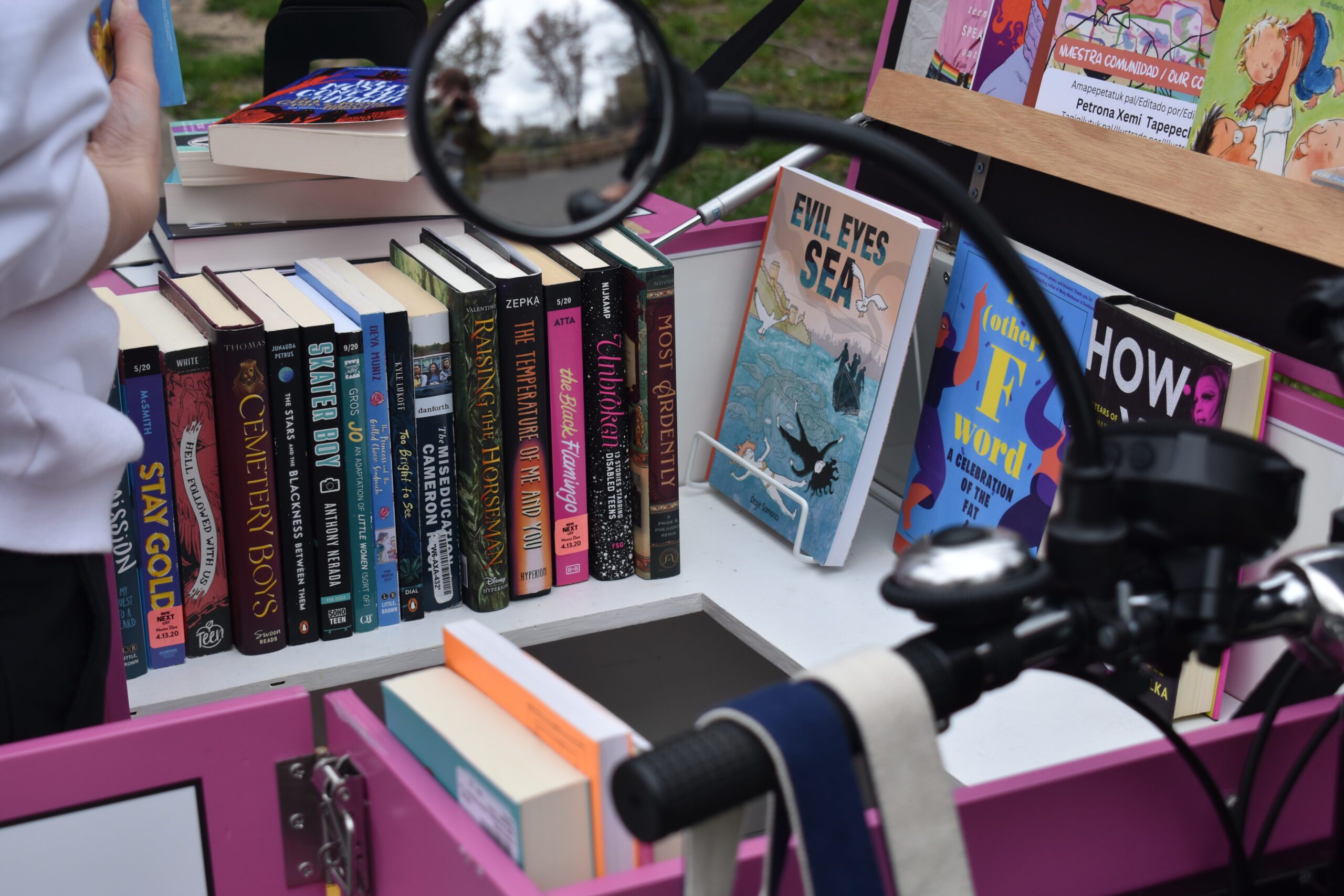
Credit: Jill Webb
Sometimes, the kids in question aren’t ready to discuss their identity with the adults in their life.
“They know that the book can give the messaging of ‘I love you, kid’ without having to overstep a boundary,” Kerimian says.
Being able to provide books for queer kids and teens is especially important to Kerimian, who struggled with identity during their youth.
“When I was outed and then ran back in the closet, I was still reading books about the queer experience,” Kerimian says.
LGBTQ2S+ literature provided Kerimian with the language to understand themself better.
“It was a book that helped me come out to my parents,” Kerimian says, referencing The Death of Vivek Oji by Akwaeke Emezi. The novel follows a genderqueer protagonist during Nigeria’s political unrest of the ’90s, exploring how identity intersects with grief, lack of acceptance and chosen families. The book now resides in Kerimian’s home, part of a sentimental collection of literature that helped them realize they were not alone. “That reminder is still there,” Kerimian says.
The book bike is particularly needed right now, as access to queer books is under attack in the U.S. LGBTQ2S+ authors face increased censorship, new legislation threatens publishers who cater to marginalized identities and conservative groups continue to target schools and public libraries carrying books about sexuality and gender.
Kerimian is more than aware about the importance of representation in literature. As a child, they understood that their gender identity didn’t match traditional gender expectations, but it would be years before they came across the term non-binary.
“I just didn’t know the word and have the language to say that,” Kerimian says. “I didn’t see people who looked like me. I didn’t read that in stories.”
People who use the book bike don’t necessarily have to converse with volunteers, or even tell them what books they picked—volunteers are happy to give space to those who are not yet comfortable to talk about their identity. But most of the time, patrons enjoy chatting with volunteers and getting book recommendations.
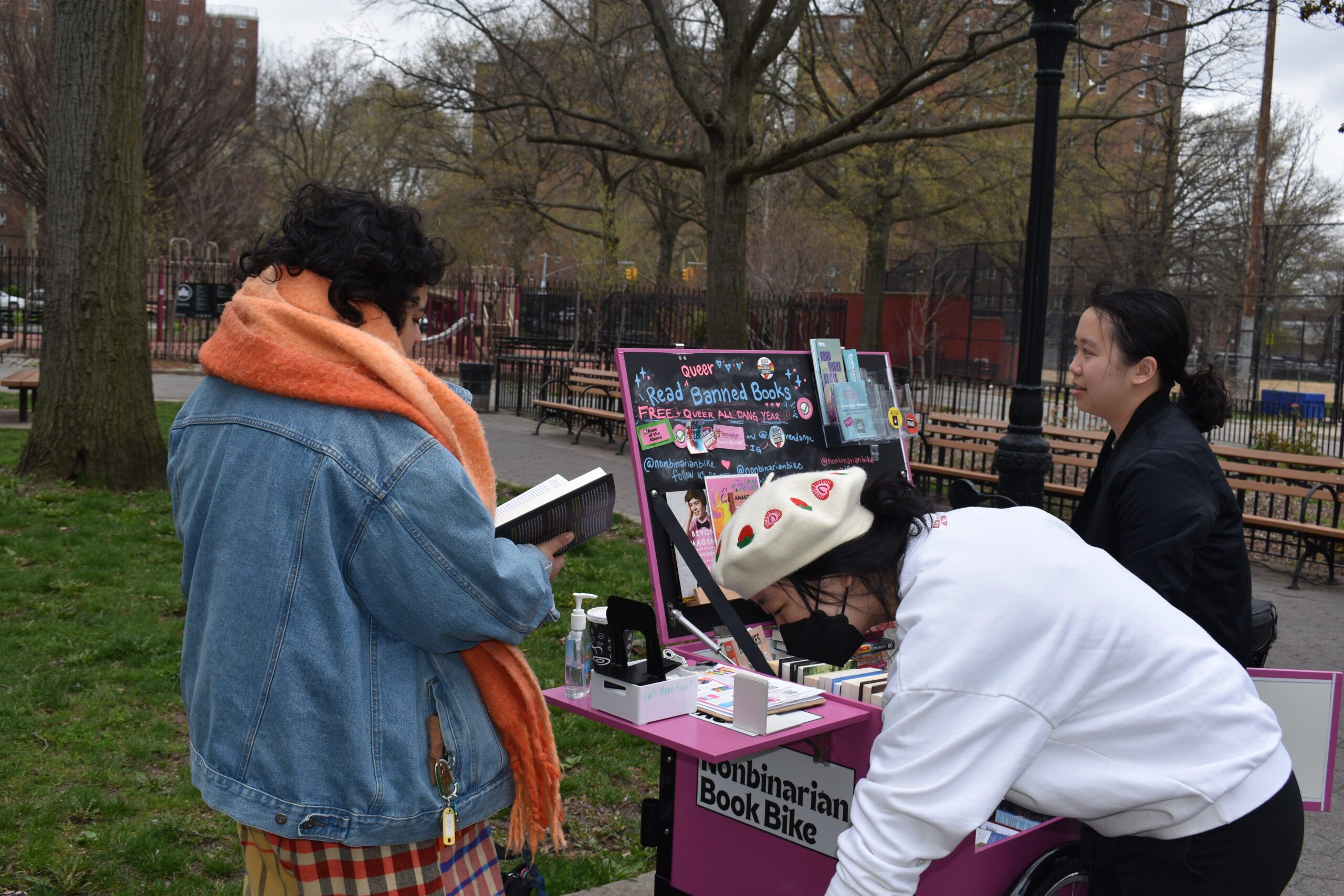
Credit: Jill Webb
“One person came up to the bike and was like ‘Yo, I’m a cis straight dude. I want to learn more,’” Lo says. They pointed him toward writer and historian Sarah Schulman’s Let the Record Show: A Political History of ACT UP New York, 1987–1993.
In a typical retail setting, booksellers might need to rush to ring up customers. Kerimian, who’s naturally chatty, appreciates being able to take more time to form connections.
“It’s not a transaction,” Kerimian says. “You can afford indulgence.”
Plus, being outside allows the bike to reach people who may not frequent bookstores because it’s out of their budget.
“I picked up City of Laughter because I’ve been wanting to read it for months, but I can’t pay for hardcover books and I just haven’t been to the library,” says Shanni Agagi, a Brooklynite (and friend of the bike) who stopped by on a windy day in April.
The accessibility of free books is crucial as libraries across New York City face a potential end to weekend service due to budget cuts. Sunday service was halted in late 2023. In 2022, the Brooklyn Public Library system opened up access to its digital collection to all U.S. residents between ages 13 to 21, in an effort to fight against censorship. Several libraries—including the Boston Public Library, LA County Library, San Diego Public Library and Seattle Public Library—have since announced similar offerings through the Books Unbanned initiative.
The bike, which had been primarily frequenting parks at the time, pivoted to hosting pop-ups in front of libraries on Sundays. The first library pop-up was at the central branch of the Brooklyn Public Library, where volunteers met a lot of neighbours eager for books.
“There’s a ton of people who [were] trying to get into the library, because they’re accustomed to that Sunday opening,” Lo says.
Lo points out that a lot of the city’s LGBTQ2S+ gatherings take place at bars and clubs, venues that come with a price tag. Plus, partying is not for everyone in the queer community—especially those who are underage, don’t drink for cultural reasons or are sober.
“New York is a queer haven, but there’s also the lack of third spaces that are free,” Lo says.
Kerimian emphasizes that the Nonbinarian Book Bike’s approach may not work in other areas of the country.
“I live in Brooklyn. I can’t suggest that a visibly queer person should go around in Florida on a bike. That’s not my lived experience,” Kerimian says. “I won’t say ‘don’t do it,’ but I’m not going to be like, ‘Sure, do exactly what I’m doing.’”
But, they note, this type of project can take other shapes, including living in digital spaces. One of the project’s volunteers doesn’t live in the city, but helps run a monthly virtual book club and pens the bike’s newsletter.
Right now, Kerimian doesn’t have immediate plans to expand the bike into a store or a non-profit.
“I don’t want that—at least, not now—because what we’re doing is still very new,” says Kerimian, who still works a day job in bookselling. “So many people are still coming to the table with ideas of how to grow it in a way that’s totally organic, and I’m not in a rush.”
They have been thinking about potentially getting multiple bikes or investing in a larger vehicle to expand distribution. In the meantime, the focus remains on serving the Brooklyn community.
“I’m not looking for a final product,” Kerimian says. “I’m looking for how we can best do the thing we set out to do.”
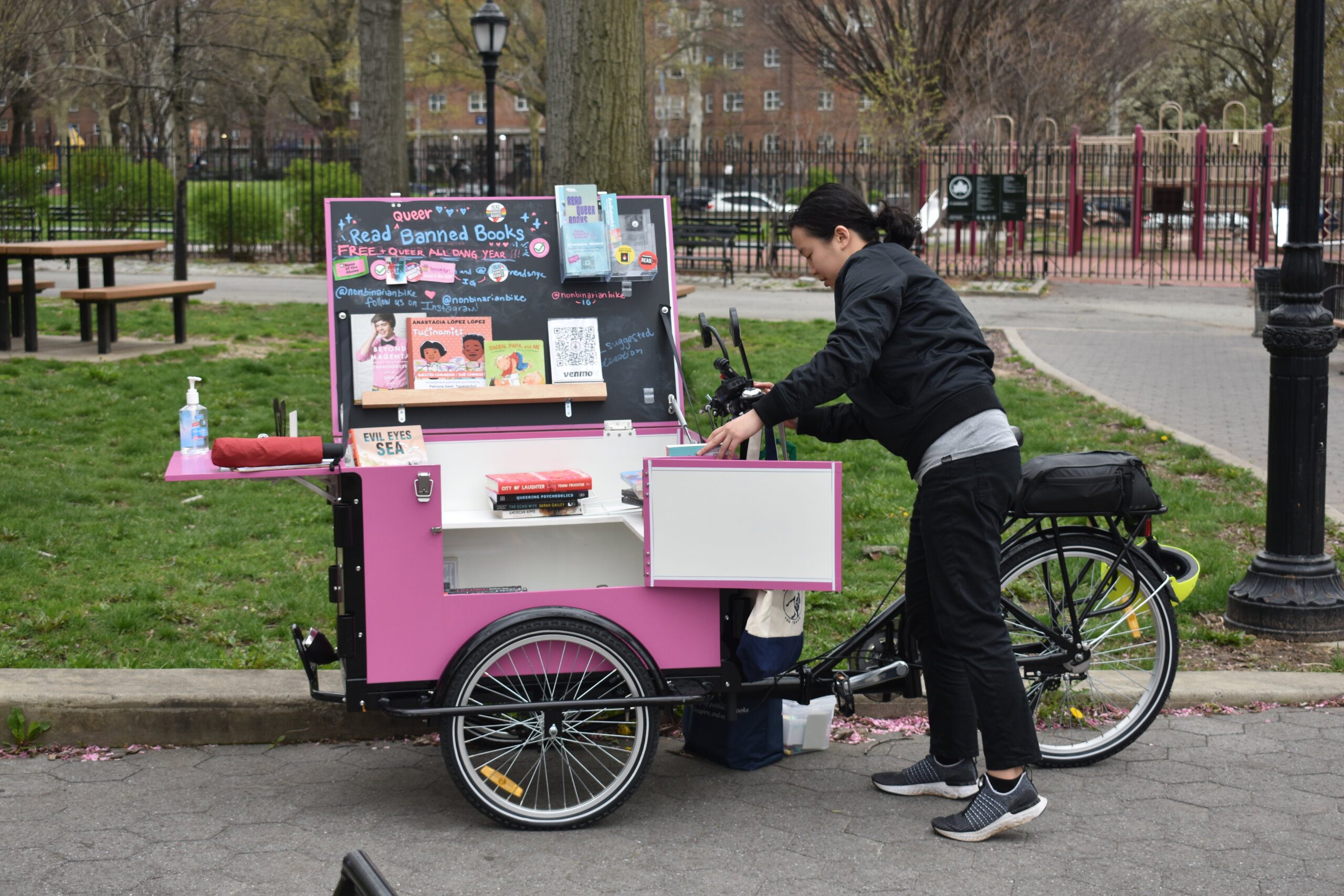
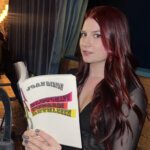
 Why you can trust Xtra
Why you can trust Xtra

